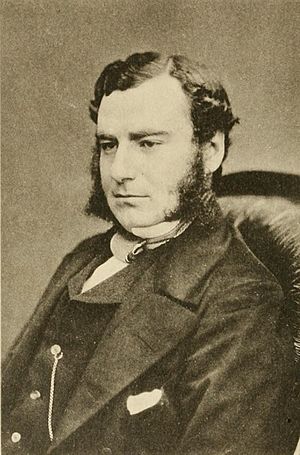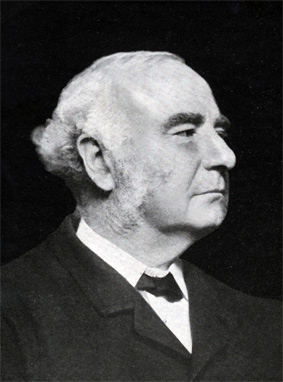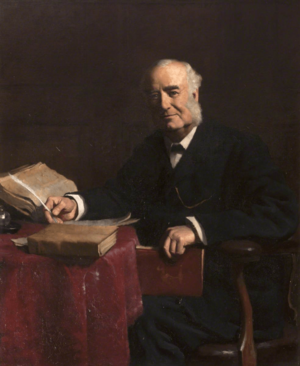Alfred Newton facts for kids
Quick facts for kids
Alfred Newton
|
|
|---|---|
 |
|
| Born | 11 June 1829 |
| Died | 7 June 1907 (aged 77) |
| Alma mater | Magdalene College, Cambridge |
| Awards | Royal Medal (1900) Linnean Medal (1900) |
| Scientific career | |
| Fields | Zoology Ornithology |
| Institutions | Cambridge University |
Alfred Newton (born June 11, 1829 – died June 7, 1907) was an English zoologist and ornithologist. A zoologist studies animals, and an ornithologist specializes in birds.
Newton was a professor at Cambridge University from 1866 until his death in 1907. He wrote many books and articles about birds. His most famous work was a four-volume Dictionary of Birds. He also helped edit the science journal Ibis. For his important work, he received the Royal Medal and the Gold Medal in 1900. He also helped start the British Ornithologists Union.
Contents
A Life Dedicated to Birds
Alfred Newton was born in Geneva, Switzerland. He was the fifth son of William Newton, a Member of Parliament. His family was quite wealthy. They lived at Elveden Hall in Suffolk, England.
From a young age, Alfred loved animals. He kept birds in cages and cared for other creatures. He also enjoyed watching and hunting game birds like pheasants and partridges. This early interest grew into a lifelong passion for birds.
When he was about five or six, Alfred had an accident that made one of his legs a bit lame. Later in life, another fall made it harder for him to walk.
In 1848, Alfred went to Magdalene College, Cambridge. He studied zoology and became friends with many other bird experts. He spent the rest of his life at Magdalene College and never married. He passed away in 1907 in Cambridge.
A Career Studying Animals
In 1853, Alfred Newton received a special travel grant from his college. From 1855 to 1864, he traveled to many places around the world. These trips included Lapland, Iceland, and the West Indies. He hoped to find the great auk, a large, flightless bird that was becoming very rare.
In 1866, he became the first Professor of Zoology and Comparative Anatomy at Cambridge University. He held this important job until he died. His portrait still hangs in the university's Zoology Department library.
Alfred Newton was one of the first zoologists to support the ideas of Charles Darwin about evolution. His early lectures at Cambridge were about how animals change over time and where they live around the world.
He was a key person in starting the British Ornithologists' Union in 1858. This group created a quarterly journal called the Ibis, which is still important today. Newton wrote several books, including Zoology and his famous A Dictionary of Birds. He also helped edit other important bird books.
Newton studied birds that were disappearing, especially those from the Mascarene Islands. His brother, Edward Newton, sent him specimens from these islands. These included the dodo from Mauritius and the Rodrigues solitaire from Rodrigues, both of which are now extinct. In 1872, he described a bird called Newton's parakeet, which lived on Rodrigues before it also became extinct.
Protecting Birds
Alfred Newton cared deeply about protecting birds. His interest in extinct birds like the dodo and great auk made him want to save other species. He helped create laws to protect birds, like the Sea Birds Preservation Act 1869.
Newton was a strong supporter of the Society for the Protection of Birds (which later became the RSPB). He worked hard to convince people, especially women, to stop using bird feathers to decorate their hats. This fashion was causing many birds to be hunted. He wrote letters to newspapers and gave speeches about this issue.
He also worked on a project to create "close-times" for animals. This idea means setting specific seasons when it's illegal to hunt or catch certain animals. The goal is to protect animals during their breeding season. This helps make sure there are enough animals for the future. This idea led to today's laws about closed seasons for fish, birds, and mammals.
The Cambridge University Museum of Zoology has many items from Alfred Newton. These include bird specimens, eggs, books, and his letters.
Key Publications
- Newton A. (1864–1907), Ootheca Wolleyana: An illustrated catalogue of the collection of birds' eggs formed by the late John Wolley. This book described a large collection of bird eggs.
- Newton A. (assisted by Hans Gadow, with contributions from Richard Lydekker, Charles S. Roy and Robert Shufeldt) (1893–1896), Dictionary of Birds. This was a very important and detailed dictionary about birds.
See also
- Alfred Newton Lecture
- T.H. Huxley
- 1860 Oxford evolution debate
- Reaction to Darwin's theory
- William Henry Flower
- X Club
- Journal of Anatomy
 | Claudette Colvin |
 | Myrlie Evers-Williams |
 | Alberta Odell Jones |



